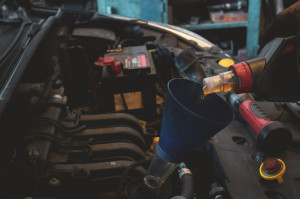 Just like your body, your car is a complex system made up of many parts that need regular care and attention to keep running at its best. Today’s vehicles are built to last longer than ever before, with many modern cars reaching 200,000 miles or more without major issues. However, this doesn’t mean that car maintenance should take a back seat. In fact, the opposite is true: the longer your car lasts, the more important it becomes to stay on top of preventive maintenance. A consistent and proactive maintenance routine can have a huge impact on your car’s performance, safety, and long-term costs.
Just like your body, your car is a complex system made up of many parts that need regular care and attention to keep running at its best. Today’s vehicles are built to last longer than ever before, with many modern cars reaching 200,000 miles or more without major issues. However, this doesn’t mean that car maintenance should take a back seat. In fact, the opposite is true: the longer your car lasts, the more important it becomes to stay on top of preventive maintenance. A consistent and proactive maintenance routine can have a huge impact on your car’s performance, safety, and long-term costs.
The Benefits of Preventive Car Maintenance
So, why is it important to maintain your car regularly? There are a few key reasons that should motivate any car owner to keep their vehicle in top shape. First and foremost, a well-maintained car performs better and is more fuel-efficient. A few small steps, like changing your oil or checking tire pressure, can significantly improve your car’s fuel economy, saving you money at the pump. But the benefits don’t end there.
The most significant advantage of a mindful maintenance routine is the prevention of major repairs. Regular checkups help catch small problems before they turn into expensive, catastrophic failures. For instance, the cost of replacing a worn-out brake pad or a clogged air filter is much lower than dealing with the aftermath of a complete brake failure or engine damage. In short, preventive maintenance can save you from both stress and financial strain.
The Hidden Dangers of Skipping Maintenance
One of the most common and preventable mistakes car owners make is neglecting basic maintenance tasks. Skipping an oil change might seem like a minor oversight, but over time, it can cause serious problems. Modern car engines depend on proper lubrication to perform efficiently and last longer. If you miss an oil change, sludge can start to build up within the engine. Sludge is a thick, sticky substance that forms when oil breaks down and accumulates over time. This buildup can clog the small passages in the engine, preventing oil from circulating properly and reaching the critical components that need it.
Without proper lubrication, engine parts begin to grind against each other, causing friction and heat that leads to premature wear and tear. Eventually, this can lead to an engine failure, which can be costly and inconvenient to repair. Regular oil changes are one of the simplest and most affordable ways to keep your engine running smoothly and to avoid expensive repairs down the line.
Simple Preventive Steps to Protect Your Vehicle
If you’ve fallen behind on car maintenance, now is the time to get back on track. By taking care of the little things, you can prevent bigger problems from arising. Here are a few essential maintenance tasks that every car owner should prioritize:
1. Regular Oil Changes
Oil is the lifeblood of your engine, so it’s crucial to keep it fresh and clean. Depending on your car’s make and model, you’ll need to change your oil every 3,000 to 7,500 miles. Check your owner’s manual for specific guidelines on how often your car needs an oil change. Fresh oil reduces friction in the engine and helps prevent the buildup of sludge.
2. Tire Maintenance
Tires are often taken for granted, but they’re one of the most critical parts of your car. Worn or improperly inflated tires can reduce fuel efficiency, affect handling, and even lead to accidents. Make sure to check your tire pressure at least once a month and before long trips. Properly inflated tires can improve fuel economy by up to 3%. It’s also a good idea to rotate your tires regularly to ensure even wear.
3. Brake Inspections
Your car’s braking system is essential for safety, so it’s important to have it checked regularly. Worn brake pads can reduce stopping power, leading to dangerous situations on the road. If you hear any unusual noises when applying the brakes, such as squeaking or grinding, get them inspected as soon as possible. Replacing worn brake pads is much cheaper than replacing damaged rotors or dealing with brake failure.
4. Fluid Checks
In addition to oil, there are other important fluids in your car that need to be monitored and replenished, including transmission fluid, brake fluid, coolant, and power steering fluid. Low fluid levels or contaminated fluids can cause your car to overheat, lose power, or even break down. Make it a habit to check these fluids regularly and top them off when needed.
5. Air Filter Replacement
Your car’s air filter keeps dirt and debris from entering the engine, but over time, it can become clogged with particles, reducing engine efficiency. A dirty air filter can decrease fuel economy and increase emissions. Replacing the air filter is a simple task that can improve your vehicle’s performance and save you money on fuel.
6. Battery Care
A dead battery can leave you stranded and cause unnecessary stress. Regularly inspect your battery for corrosion and ensure that it’s securely connected. If your battery is more than three years old, it’s a good idea to have it tested to ensure it’s still holding a charge. If you experience slow starts or electrical issues, it might be time for a replacement.
7. Scheduled Professional Inspections
Even if you’re diligent about DIY maintenance, it’s still important to have your vehicle professionally inspected at least once a year. A certified mechanic can check for any hidden problems that you might not be able to spot on your own, such as issues with the transmission, exhaust system, or suspension. Catching these problems early can save you from expensive repairs in the future.
Treat Your Car Like an Investment
Remember, your car is one of your largest investments, and just like any investment, it requires ongoing care. Regular maintenance might seem like an unnecessary expense at times, but the truth is that it’s a small price to pay for avoiding the high costs of major repairs. Plus, a well-maintained vehicle performs better, lasts longer, and is safer to drive.
Taking the time to follow a preventive maintenance routine not only helps your car run smoothly but also gives you peace of mind knowing that you’re protecting your investment. If you’ve fallen behind on maintenance, don’t worry—there’s no better time than now to get back on track. Start with the basics, and before you know it, you’ll be able to enjoy your car for years to come with fewer headaches and unexpected expenses.







